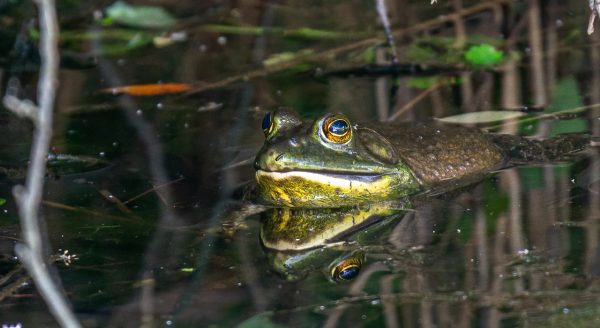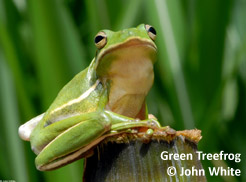Did you know that releasing plants or animals from your home into the outdoors (including aquarium plants and animals) is unlawful in Virginia? In addition, they can impact native wildlife by altering habitats, introducing disease, increasing competition for food resources, and increasing predation on native wildlife and plants.

American bullfrog, Photo by Carol Annis
Frogs are a particularly vulnerable group of animals to these impacts. A frog purchased from a pet store may have originated from thousands of miles away and potentially harbor a disease that if released into the outdoors, could infect our native frogs. A deadly fungus, commonly known as chytrid, has been known to spread in this manner, and is a leading cause of amphibian population declines. While it may seem harmless to release an unwanted pet fish into local water bodies and waterways, this too can cause a variety of issues, such as the potential to increase predation on our native frog eggs and tadpoles.
If you find yourself in a situation where you must relinquish a pet, please be “habitat aware” and do not release them into the outdoors, but consider the following options:
- Continue to care for it. Remember, part of being a responsible pet owner is recognizing that pets are a lifetime commitment.
- Give the animal to someone else who would like to care for it.
- Return it to the place where it was purchased.

Green Treefrog. Photo by John White.
- Donate it to a local natural history museum, nature center, animal rescue center, etc. However, do keep in mind that oftentimes these locations may already be at capacity and will be unable to take your donation.
- Have the animal humanely euthanized.
If you would like more information about this topic, please check out the following resources:
- Habitatitude ™ – A program created through a partnership between U.S. Fish and Wildlife Service, National Oceanic and Atmospheric Administration, Sea Grant, and Pet Industry Joint Advisory Council.
- Don’t Turn it Loose! (pdf) – A downloadable brochure created by Partners in Amphibian and Reptile Conservation on how to handle unwanted pets and classroom animals.

